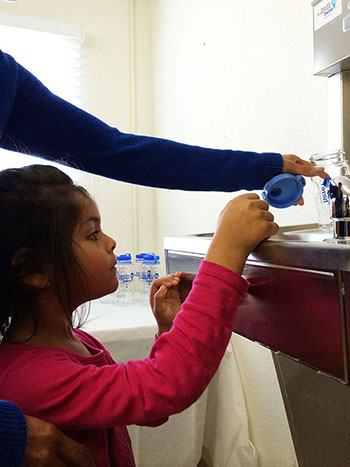By Elizabeth Zach, RCAC staff writer
Most people in the U.S. today pay little attention to drinking fountains. They’re as ubiquitous as political advertising during election season.
But across rural California, particularly where immigrant farm laborers live and work, a drinking fountain – plainly put, access to free safe drinking water – is a luxury, despite the fact that such access is a basic human right.
Approximately 25 percent of California’s 9,846 schools do not meet the state and federal mandate to provide free, fresh drinking water to school children at mealtimes; by some estimates, 500 California schools do not provide safe drinking water at all to their students because of recurring safe drinking water compliance violations. And even for those that do, many drinking fountains are aging, poorly maintained and often extremely uninviting.

Therefore, when the San Jose Community Center in Thermal, Calif., had a ribbon-cutting ceremony in late January for a new filling station for water bottles, dozens of residents turned out, young and old. Maria Castro, her lined and wizened face framed by a braided bun, her daughter Gabriela Rodriguez and her grand-daughter, Alanne Rodriguez were there. Farmers, Samuel David Castro and Jose Cervera, kindly accepted reusable bottles for themselves and requested additional ones for their señoras at home.
“We came because this is so important,” said Thermal resident Hilda Castro.
A day later, when a ceremony inaugurated a fountain at Lamont Park in Kern County, local politicians and nearby residents also celebrated.
“When I was in high school, we used to actually test the water in chemistry class,” joked Arvin City Council member Jose Gorrula, Jr. “We need long-term solutions, but we also need interim solutions, and this is why we’re here today.”
Both ceremonies were largely symbolic, highlighting a far-reaching plan to bring more of these “taps” to small, rural communities across the state.
It works like this: Rural Community Assistance Corporation (RCAC) is partnering with The California Endowment, Community Water Center (CWC) and Pueblo Unido Community Development Corporation (PUCDC) in an innovative pilot program called Agua4all. This program aims to increase access to and consumption of safe drinking water in California, starting with South Kern County and the Eastern Coachella Valley.
Through the pilot program, RCAC is installing more than 120 water dispensers in schools and other public places throughout these two areas. Where necessary, water treatment will also be installed to filter out arsenic or other contaminants so that residents finally have public access to potable water. Reusable bottles will also be made available where possible to optimize filling station use. CWC and PUCDC are providing on-the-ground support for the year and a half long pilot.
The program also addresses public health crises – obesity and Type II diabetes. When safe water is unavailable the nearest and most affordable option is a sugar sweetened beverage.
“How are we to teach children that drinking water is a healthy option if we can’t provide safe drinking water in their schools and/or their homes?” said Stanley Keasling, CEO, RCAC.
In California, 41 percent of children, 62 percent of adolescents and 24 percent of adults drink at least one soda or other sugar-sweetened beverage every day. By comparison, in a recent California Health Interview survey, 73 percent of South Kern and 58 percent of Eastern Coachella Valley children drank sugar-sweetened beverages the day before the survey was administered, as compared to just 40 percent of children surveyed statewide.
Permanent solutions, which include upgrading local community water systems and treating harmful contaminants so that the water is safe, are very costly to implement and maintain. Acquiring funding for these types of projects is also a very long process, and for many California water systems it often takes more than three years to apply for funding, receive the award and complete an infrastructure project. Agua4All is an interim solution for safe water and also a long-term infrastructure upgrade to increase consumption and sustain high consumption rates over time. This project has the potential, as it grows all across rural California, to impact millions of Californians’ health. Currently, more than a million Californians lack access to safe drinking water in their schools and homes. In low-income rural communities, unsafe water, which can be a result of naturally occurring or human-caused contaminants, can cause many health problems, including an increased risk for cancer.
Costs covered through the project include the tap units themselves, which range in price from just under $1,000 – $3,000; water treatment, which for point-of-use media adsorption arsenic filtration is at least $1,500 per tap; reusable water bottles, installation, operations and maintenance costs; program coordination and administration; and program communications and outreach in an effort to change the negative perception of California’s tap water.
This campaign is so vital, in fact, that during a press conference at the California State Capitol on January 7, renowned chef Jamie Oliver announced his support for RCAC’s Agua4All pilot project.
“Clean, safe water is essential for a healthy life, and it’s a human right. Agua4All is for everyone,” Oliver said.
*********************************
This article was also published in Rural Matters, March 2015 issue.
